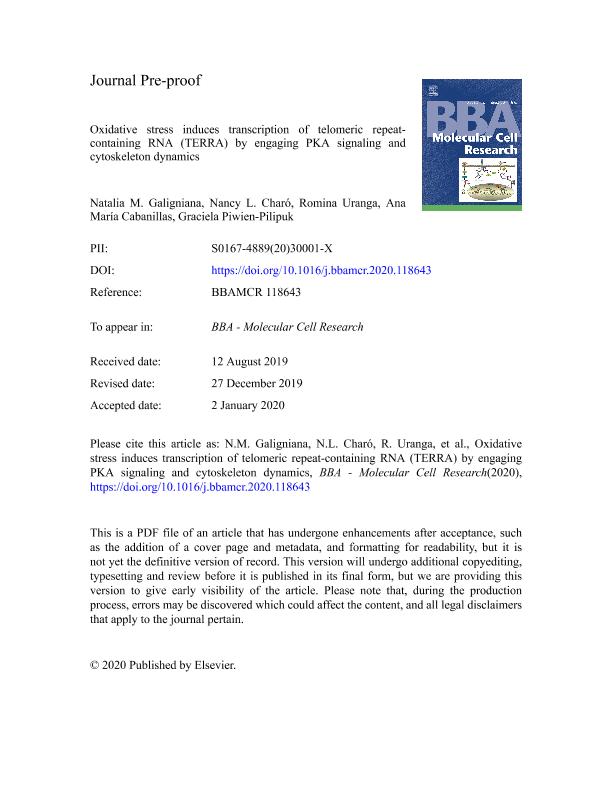Mostrar el registro sencillo del ítem
dc.contributor.author
Galigniana, Natalia Maricel

dc.contributor.author
Charó, Nancy Lorena

dc.contributor.author
Uranga, Romina Maria

dc.contributor.author
Cabanillas, Ana Maria de Los A.

dc.contributor.author
Piwien Pilipuk, Graciela

dc.date.available
2023-06-29T19:44:45Z
dc.date.issued
2020-04
dc.identifier.citation
Galigniana, Natalia Maricel; Charó, Nancy Lorena; Uranga, Romina Maria; Cabanillas, Ana Maria de Los A.; Piwien Pilipuk, Graciela; Oxidative stress induces transcription of telomeric repeat-containing RNA (TERRA) by engaging PKA signaling and cytoskeleton dynamics; Elsevier Science; Biochimica et Biophysica Acta-Molecular Cell Research; 1867; 4; 4-2020; 1-14
dc.identifier.issn
0167-4889
dc.identifier.uri
http://hdl.handle.net/11336/201838
dc.description.abstract
Long non-coding RNAs transcribed from telomeres, known as TERRA (telomeric repeat-containing RNA), are associated with telomere and genome stability. TERRA abundance responds to different cell stresses; however, no studies have focused on oxidative stress, condition that damages biomolecules and is involved in aging and disease. Since telomeres are prone to oxidative damage leading to their dysfunction, our objective was to characterize TERRAs and the mechanisms that control their expression. TERRA increased in cells exposed to H2O2 and reverted by antioxidant treatment. TERRAs are also induced in brown adipose tissue of mice exposed to cold, which raises mitochondrial ROS. In cells exposed to H2O2, ChIP showed that chromatin landscape was modified favoring telomere transcription. TERRAs interacted with HP1α/γ, proteins that were found recruited to subtelomeres. Since HP1γ interacts with the transcriptional machinery, TERRAs may stimulate their own expression by recruiting HP1γ to subtelomeres. TERRA induction reverted within 2 h after removal of H2O2 from culture medium, suggesting they have protective functions. This was supported by rapid TERRA induction following a second H2O2 challenge. PKA inhibitors H89 and PKI blocked TERRA increase by H2O2 or IBMX+Forskolin treatment, suggesting PKA signaling regulates TERRA induction. Treatment of cells with drugs that disturb cytoskeleton integrity or growing cells on surfaces of different stiffness known to generate differential cytoskeleton tension also modified TERRA levels and sensitized cells to lower H2O2 concentrations. In summary, we show that TERRAs are induced in response to oxidative stress and are regulated by PKA as well as by changes in cytoskeleton dynamics.
dc.format
application/pdf
dc.language.iso
eng
dc.publisher
Elsevier Science

dc.rights
info:eu-repo/semantics/openAccess
dc.rights.uri
https://creativecommons.org/licenses/by-nc-sa/2.5/ar/
dc.subject
CYTOSKELETON DYNAMICS
dc.subject
OXIDATIVE STRESS
dc.subject
PKA
dc.subject
TELOMERE DYSFUNCTION
dc.subject
TERRA
dc.subject
TRANSCRIPTIONAL MEMORY
dc.subject.classification
Bioquímica y Biología Molecular

dc.subject.classification
Ciencias Biológicas

dc.subject.classification
CIENCIAS NATURALES Y EXACTAS

dc.title
Oxidative stress induces transcription of telomeric repeat-containing RNA (TERRA) by engaging PKA signaling and cytoskeleton dynamics
dc.type
info:eu-repo/semantics/article
dc.type
info:ar-repo/semantics/artículo
dc.type
info:eu-repo/semantics/publishedVersion
dc.date.updated
2023-06-28T15:10:22Z
dc.journal.volume
1867
dc.journal.number
4
dc.journal.pagination
1-14
dc.journal.pais
Países Bajos

dc.journal.ciudad
Amsterdam
dc.description.fil
Fil: Galigniana, Natalia Maricel. Consejo Nacional de Investigaciones Científicas y Técnicas. Instituto de Biología y Medicina Experimental. Fundación de Instituto de Biología y Medicina Experimental. Instituto de Biología y Medicina Experimental; Argentina
dc.description.fil
Fil: Charó, Nancy Lorena. Consejo Nacional de Investigaciones Científicas y Técnicas. Instituto de Biología y Medicina Experimental. Fundación de Instituto de Biología y Medicina Experimental. Instituto de Biología y Medicina Experimental; Argentina
dc.description.fil
Fil: Uranga, Romina Maria. Consejo Nacional de Investigaciones Científicas y Técnicas. Centro Científico Tecnológico Conicet - Bahía Blanca. Instituto de Investigaciones Bioquímicas de Bahía Blanca. Universidad Nacional del Sur. Instituto de Investigaciones Bioquímicas de Bahía Blanca; Argentina
dc.description.fil
Fil: Cabanillas, Ana Maria de Los A.. Consejo Nacional de Investigaciones Científicas y Técnicas. Centro Científico Tecnológico Córdoba. Centro de Investigaciones en Bioquímica Clínica e Inmunología; Argentina
dc.description.fil
Fil: Piwien Pilipuk, Graciela. Consejo Nacional de Investigaciones Científicas y Técnicas. Instituto de Biología y Medicina Experimental. Fundación de Instituto de Biología y Medicina Experimental. Instituto de Biología y Medicina Experimental; Argentina
dc.journal.title
Biochimica et Biophysica Acta-Molecular Cell Research

dc.relation.alternativeid
info:eu-repo/semantics/altIdentifier/url/https://linkinghub.elsevier.com/retrieve/pii/S016748892030001X
dc.relation.alternativeid
info:eu-repo/semantics/altIdentifier/doi/https://doi.org/10.1016/j.bbamcr.2020.118643
Archivos asociados
